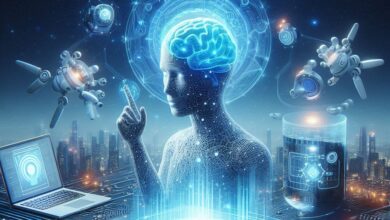Growing Concerns of AI Misinformation and Its Impact on U.S.

Artificial Intelligence (AI) has transformed various industries, but as its capabilities grow, so do concerns about its misuse, particularly in the context of the upcoming U.S. elections. According to recent surveys, approximately 60% of Americans are worried about AI-generated misinformation and its potential impact on democracy. As AI technology evolves, the risks of its abuse in critical moments like elections become more significant.
AI Misinformation in U.S. Elections
Misinformation is not a new threat to democratic processes, but AI has escalated this issue by enabling the rapid creation and dissemination of false information. Jensen Huang, CEO of Nvidia, emphasizes that the only way to combat AI misuse is through even more advanced AI systems. He argues that AI, while being a part of the problem, must also be the solution.
As Huang pointed out during a speech at the Bipartisan Policy Center in Washington, AI’s ability to generate fake data at incredible speeds means that countermeasures must be equally swift. He likens the current situation to cybersecurity, where constant and advanced threats require equally advanced systems to protect against them. Just as cyberattacks are an ongoing challenge for companies and governments, AI misuse presents a similar, if not more complex, risk to society.
AI’s Role in Safeguarding Democracy
With the upcoming U.S. federal elections in November, both Republicans and Democrats are concerned about the influence of AI on the democratic process. The rise of AI-generated disinformation poses a unique threat, with two in five Americans believing that AI will be predominantly used for malicious purposes during the elections. From deepfakes of candidates to the spreading of false narratives, the potential for AI to distort the truth is alarming.
A Pew Research survey found that nearly 60% of Americans share this concern, and only a small fraction—about 5%—are optimistic about AI’s potential benefits in this area. Huang has called for the U.S. government to step up its AI game to stay ahead of these risks. He suggested that every department, particularly those related to energy and defense, should integrate AI into their operations. Moreover, he proposed building a super AI computer to enhance the nation’s AI capabilities and protect against future threats.
The Energy Demands of Advanced AI Systems
As AI systems continue to evolve, so do their energy requirements. Today’s AI data centers already consume around 1.5% of global electricity, but Huang predicts that future AI models will require 10 to 20 times more power. This is a significant concern, not only from an environmental standpoint but also because it highlights the growing scale and complexity of AI models.
Huang envisions a future where AI models can teach one another, which could further increase energy consumption. To mitigate this issue, he proposes building AI data centers near sources of surplus energy that are difficult to transport. Since AI models can function independently of location, these centers could be situated in remote areas with abundant energy resources. This solution would help manage the rising energy demands while supporting AI development.
Challenges in Regulating AI
Amid the rising concerns, there is an ongoing debate about how to regulate AI effectively. In California, Governor Gavin Newsom recently vetoed a bill known as SB 1047, which aimed to impose mandatory safety measures on AI systems. The bill faced strong opposition from major tech companies like OpenAI, Meta, and Google, which argued that its stringent standards would hinder AI innovation.
Read more OpenAI Secures $6.6 Billion in Funding, Valued at $157 Billion: A New Era in AI Development
Newsom defended his decision by stating that the bill’s regulatory approach was overly restrictive and would stifle innovation. He believes that it would fail to protect people from the real dangers posed by AI while also slowing down progress in AI research and development.
The Path Forward: Striking a Balance
The debate over how to regulate AI highlights the need for a balanced approach—one that encourages innovation while ensuring public safety. As AI continues to shape the future of industries and democratic processes, policymakers must grapple with how to harness its potential while minimizing its risks.
In the meantime, companies and governments are tasked with developing more advanced AI systems to counter AI misuse. The future of AI will require not only more sophisticated algorithms but also greater collaboration between the public and private sectors to address the challenges posed by AI-generated misinformation and its impact on democracy.
In conclusion, AI is both the problem and the solution to many of the challenges it creates. As Huang suggests, only through more advanced AI can society effectively combat the misuse of AI in critical areas like elections. However, with the growing energy demands and regulatory challenges, finding a sustainable and secure path forward will be key to ensuring that AI benefits society without compromising democratic values.
Important Notice: The content presented in this article is intended for informational purposes only and should not be interpreted as financial advice. Coinshibainu.com bears no responsibility for any investment decisions made relying on the information contained herein. It is highly recommended to consult with a qualified expert or financial advisor before making any investment decisions.


